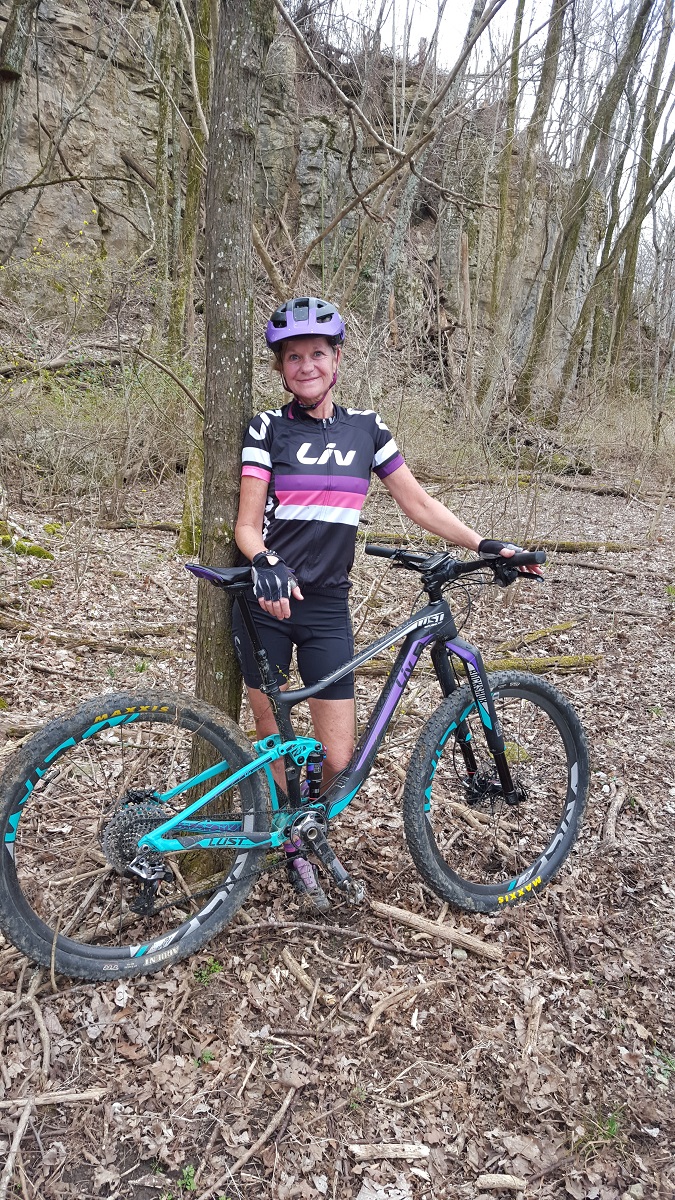Grace and the Great Divide
In 2016, Adventure Cyclist contributor Dan D’Ambrosio profiled Grace Ragland, who had refused to let a childhood diagnosis of MS keep her from completing some of mountain biking’s most challenging races, including the Breck Epic and the Leadville 100 (which she finished four times).
Two years later, the 57-year-old embarked on the Tour Divide, a more than 2,700-mile, self-supported race that follows Adventure Cycling’s Great Divide Mountain Bike Route from Banff, Alberta in Canada to Antelope Wells, New Mexico.
Aside from taking on one of mountain biking’s most challenging races, Ragland hoped the trip would help patch a damaged relationship with her son. But as she prepared to start the race in June 2018, she began to feel ill as another disease — this time cancer — made its presence known. Ragland died in January 2020 from non-Hodgkin’s lymphoma.
A new documentary by Kris Wheeler, “Grace and the Great Divide,” magnifies the indefatigable spirit of Ragland that D’Ambrosio highlighted in 2016. Wheeler chronicles Ragland’s inspiring ride and explores how cycling helped her make sense of a messy, complicated, human life. He’s launched a crowdfunding campaign to help get the word out about Ragland’s story.
Grace in Charge
This story was originally published in the December 2016/January 2017 issue of Adventure Cyclist magazine.
When Grace Ragland was a 10-year-old girl growing up in Huntsville, Alabama, she liked to play with her dolls, even bringing them along on frequent family camping trips. On one of those camping trips, Ragland suddenly lost the sight in her right eye.
She had no idea what was happening to her.
“I’ll never forget playing with my doll, and it was odd, only seeing half of her,” Ragland said. “When you’re 10 and that happens, what do you do? You go tell your mother.”
Fortunately, Ragland’s parents didn’t panic or make her feel that something terrible was afoot.
“I just happened to have these awesome parents,” Ragland said. “They never worried me for one second.”
Instead Ragland’s parents prepared her for a trip to the hospital by telling her she would get to pick out some new pajamas for the occasion and that she would make friends with the sick children there, making them feel better. It would be eight long years before Ragland would receive a diagnosis of multiple sclerosis.
“By today’s standards, I probably would have been diagnosed at 10 years old,” Ragland said. “Back then, the technology was so different. The face of MS has changed dramatically, it’s nothing like when I was diagnosed.”
The symptoms of multiple sclerosis, which run the gamut from blurred or double vision to vertigo, numbness, and muscle weakness, and, in severe cases, paralysis, generally appear between the ages of 20 and 40.
“I would be considered a juvenile with MS — it is definitely unusual,” Ragland said. “I don’t know any differently. People are born deaf or blind; they learn to adapt. That’s what I’ve done. It would be kind of odd for me to not have numb feet and numb hands and all the other things I deal with.”
The best time racing
Ragland has done more than adapt; she has thrived as a cyclist who races mountain bikes and is a brand ambassador for Liv, Giant’s line of women’s bikes. She takes her bikes with her wherever she goes.
Ragland also works with the National Interscholastic Cycling Association (NICA) to introduce kids to cycling who might not be aware of how bikes can improve their lives and their health. Headquartered in Berkeley, California, and founded in 2009, NICA has involved high-school–age kids in racing mountain bikes, with 19 leagues across the country in 18 states.
The organization has also taken on an environmental mission, teaming up with REI and the International Mountain Biking Association to form the Teen Trail Corps initiative, teaching riders to respect other trail users and help maintain trails.
Ragland has competed in several mountain bike stage races, from the BC Bike Race in British Columbia, billed as “Your Ultimate Singletrack Experience,” to the Breck Epic in Breckenridge, Colorado, six days of riding 35- to 50-mile loops in the mountains beginning and ending within a mile of downtown Breckenridge.

Her claim to fame, she says, is the Leadville 100 in Leadville, Colorado, which she has done four times, despite the fact that it is billed as being created for “only the most determined athletes.” The course involves 100 miles of high-altitude riding in the Colorado Rockies, starting at more than 10,000 feet and climbing to more than 12,000 feet.
Ragland, who is featured in a 2010 documentary about the Leadville 100 called Racing Across the Sky, likes to say she has raced with Lance Armstrong (before his fall from grace).
“I passed him when he was going down the hill and I was still going up,” Ragland said. “He was 20 miles ahead of me.”
She has achieved all of this despite suffering from multiple sclerosis for nearly her entire life.
“I’ve had the best time racing,” Ragland said. “I’ve gone from being really, really fast to now, when to finish is to win.”
Don’t worry, be happy
Ragland’s love affair with bicycles began at a young age. She got her first bike at eight.
“Before that, I rode my brother’s bike,” she said. “Don’t mention that. He would probably beat me up.”
Ragland has a deceptively simple approach to life with multiple sclerosis, which began so many years ago when her parents accentuated the positive even when they were faced with a 10-year-old daughter displaying extremely distressing physical symptoms no one could diagnose.
“Life in general is so much more enjoyable when you’re happy,” Ragland said. “How can you not be happy if you are on a two-wheeler? I believe in the power of positive thinking and I believe in myself every day. Every day I find a way to be happy.”
Ragland said she rides from nine to 15 hours each week, riding six days some weeks. Where does she like to ride?
“On the earth, anywhere,” she answers with a laugh. “For real, I don’t care. I have a minivan with no seats in back. I call it my garage.”
Ragland usually has at least two, if not three, bikes in the back of her seatless minivan, both road and mountain bikes.
“Which bike I’ll ride depends on where I am,” she said. “I don’t care how fast. I’m not at all about, ‘I averaged this speed today.’ I got out, got to pedal my bike, and I saw a bluebird. I saw dragonflies. I saw cows and horses, I saw garbage and trash, I saw people smoking. All of these I’m observing.”
Any country will do
Despite her Zen approach to cycling when she’s not racing or representing Liv, Ragland has never done a proper overnight bike tour. But it’s on her bucket list.
“I want to travel a country, I don’t care where,” she said. “I’m going to make it happen. That’s my motto. I find a way, whether by myself or have people meet me. It intrigues me so much. Think of all the people I haven’t met. I probably haven’t met my best friend yet.”
Maybe not, but Ragland certainly has some pretty good friends already. One of them invited Ragland to accompany her to this year’s Tour de France. Ragland said she navigated around France “like a pro.”
She took the trip even though she is a local mountain bike skills instructor for NICA and gives a lot of clinics in the summer. Ragland already had a “full plate.”
“This girl calls me up two weeks before departing for France and says, ‘I want to take somebody and I can’t think of anybody more deserving than you,’” Ragland remembered. “I said, ‘I need 24 hours.’ I juggled a whole lot of stuff to make it happen.”
The trip to France was “one of the coolest things” Ragland had ever done, she said, describing the country as “super bike friendly.”
She has many friends across the country from past races.
“We try to hook up every summer,” Ragland said. “If we don’t do an event together, we try to be in a location to support each other while one is doing an event and another is waiting to do another event. We stay in contact. It’s my family. It’s my life.”
In charge
When Ragland was diagnosed with multiple sclerosis 37 years ago, there were no therapies of any kind for the disease. There were no drugs. Today, she said, there are 13 or 14 therapies out there. None of them reverses the disease, but therapy can slow its progress.
Ragland started on a medication called Copaxone in 2005. Along with diet and exercise, the medicine has been “the perfect recipe” to combat her MS, she said. She injects 40 milligrams of Copaxone three times a week, on Monday, Wednesday, and Friday, so she can have the weekend off.
Her advice for anyone facing a diagnosis of multiple sclerosis is to “be your own advocate.”
“I just encourage everybody to do their homework on it,” she said.
Despite the strides she has made against her disease, Ragland still suffers bouts of numbness, complications with her vision, and fatigue, especially in the heat, which is the enemy of anyone dealing with multiple sclerosis.
“Some days I’m really exhausted,” Ragland said. “The heat plays a hard role. Heat is super hard for me, and of course I live in the South, with its heat and humidity.”
Sometimes Ragland has particular issues with her right leg.
“I have what I call an ‘Elvis leg,’” she said. “It wiggles and flops. I don’t have control walking across the street. It comes and goes. It’s odd.” Despite the challenges of her disease, Ragland has maintained the positive outlook her parents first instilled in her when she was a child dealing with unexplained maladies.
Ragland believes that her mother, who died 15 years ago, would be proud of how far she has come and how she has never let multiple sclerosis define her life.
“I have the bull by the horns, I’m in charge, I’m winning this race,” Ragland said. “I intend to ride my bike until I cannot, and I hope that will be the rest of my life.”


